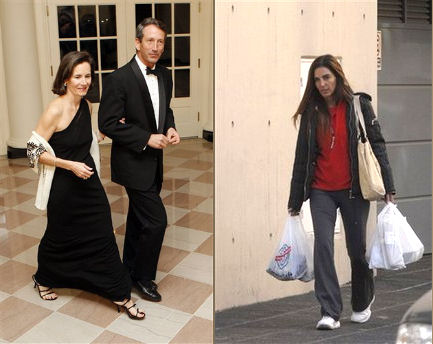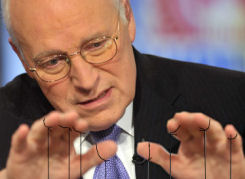Posted on Thursday 16 July 2009
By THE ASSOCIATED PRESS
July 15, 2009Gov. Mark Sanford headed out of state for personal time with his wife, as the two try to reconcile, and skipped a meeting with a top economic adviser ahead of what is expected to be more bad economic news, including rising unemployment. A spokesman for Mr. Sanford, Joel Sawyer, refused to say where the Sanfords were going or how they were getting there, but said they would not be traveling with their four sons. Mr. Sanford is in the midst of trying to reconcile with his wife, Jenny Sanford, after a tearful confession of an affair with an Argentine woman, MarÃa Belén Chapur. Mr. Sawyer said meetings skipped this week would be rescheduled.

A few weeks ago, South Carolina Governor Mark Sanford needed to take some personal time. Seems like the job was getting to him. So he took off to visit his girlfriend/soulmate in Argentina, while Jenny and the boys managed hearth and home on Sullivan’s Island on the coast. Flash to the present, after a tough couple of weeks, Governor Sanford has decided to take some personal time. So he’s off to an undisclosed location. What’s different? This time he took a woman with him, his wife Jenny, while his soulmate in Argentina, MarÃa Belén Chapur, manages hearth and home [and groceries] in Buenos Aires.
I’m thinking that being one of the ‘chosen’ like King David, must be hard work. South Carolina is third hardest hit by the recession with 12% unemployment. I wonder what kind of shape Israel was in back in the days when King David was up on the roof watching the ladies bathe and first spied Bathsheba?
The book’s opening anecdote tells of an unnamed CIA briefer who flew to Bush’s Texas ranch during the scary summer of 2001, amid a flurry of reports of a pending al-Qaeda attack, to call the president’s attention personally to the now-famous Aug. 6, 2001, memo titled "Bin Ladin Determined to Strike in US." Bush reportedly heard the briefer out and replied: "All right. You’ve covered your ass, now." Three months later, with bin Laden holed up in the Afghan mountain redoubt of Tora Bora, the CIA official managing the Afghanistan campaign, Henry A. Crumpton [now the State Department’s counterterrorism chief], brought a detailed map to Bush and Cheney. White House accounts have long insisted that Bush had every reason to believe that Pakistan’s army and pro-U.S. Afghan militias had bin Laden cornered and that there was no reason to commit large numbers of U.S. troops to get him. But Crumpton’s message in the Oval Office, as told through Suskind, was blunt: The surrogate forces were "definitely not" up to the job, and "we’re going to lose our prey if we’re not careful."
George W. Bush is today making his final visit to Camp David as president.
He will likely miss the place: According to CBS News White House Correspondent Mark Knoller, today’s trip marks Mr. Bush’s 149th visit to the presidential retreat. The planned three-day stay, during which the president is being joined by family and former and current aides, will bring his total time spent at Camp David to all or part of 487 days.
Yes, that’s 487 days. And Camp David is not even where the president has spent the most time when not at the White House: Knoller reports that Mr. Bush has made 77 visits to his ranch in Crawford during his presidency, and spent all or part of 490 days there.
I don’t really begrudge President Bush or Governor Sanford having a lot of personal time. Public Office is a bit like being a sole practitioner Physician – always on call. Actually, it’s worse because there are so many evening functions. But I’ll hold my point. These people take their vacations when there’s desperate work to be done. Governor Sanford is staying in office as he says to "win back the trust of the people of South Carolina" and to work out his personal issues. Meanwhile, he fought to turn down the Stimulus money to remain true to his Conservative Principles. Using the Governorship of a floundering State as a Marital Therapy experience takes the cake for misguided thinking in office – right up there with a President looking at an urgent comminication of an impending terrorist attack as a C.Y.A. maneuver for an aide.


 I love smart Russian poet expatriot bloggers, particularly when they agree with me. What she’s saying is the very fish we’ve all been smelling. The only question is whether Cheney is getting in front of a story of another real black-op like torturing already compliant witnesses to get them to confirm lies so he can start an illegal war, or whether this whole recent story is much ado about nothing – a smoke screen. Listening to Liz Cheney, I’m suspecting the latter, but always open to a Dick Cheney curve-ball.
I love smart Russian poet expatriot bloggers, particularly when they agree with me. What she’s saying is the very fish we’ve all been smelling. The only question is whether Cheney is getting in front of a story of another real black-op like torturing already compliant witnesses to get them to confirm lies so he can start an illegal war, or whether this whole recent story is much ado about nothing – a smoke screen. Listening to Liz Cheney, I’m suspecting the latter, but always open to a Dick Cheney curve-ball. , but then it began to leak, and finally down it came with a thud. I think of the early Bush Administration in the same way – they controlled what we knew, and for inapparent reasons, our information services [television, the newspapers] went along with it. When I read back over the 2001-2002 articles in the paper or the transcripts of "
, but then it began to leak, and finally down it came with a thud. I think of the early Bush Administration in the same way – they controlled what we knew, and for inapparent reasons, our information services [television, the newspapers] went along with it. When I read back over the 2001-2002 articles in the paper or the transcripts of " VICE PRES. CHENEY: Well, in the nuclear weapons arena, you’ve got sort of three key elements that you need to acquire. You need the technical expertise. You need to have a group of scientists and technicians, engineers, who know how to put together the infrastructure and to build a weapon. He’s got that. He had it because of his program that was there previously, which I’ll come back and talk about in a minute, but we know he’s been working for 20 years trying to acquire this capability. He’s got a well-established scientifically, technically competent crew to do it.
VICE PRES. CHENEY: Well, in the nuclear weapons arena, you’ve got sort of three key elements that you need to acquire. You need the technical expertise. You need to have a group of scientists and technicians, engineers, who know how to put together the infrastructure and to build a weapon. He’s got that. He had it because of his program that was there previously, which I’ll come back and talk about in a minute, but we know he’s been working for 20 years trying to acquire this capability. He’s got a well-established scientifically, technically competent crew to do it. That 2002 Cheney interview hasn’t got one certified fact in it anywhere. If anything, it’s a study in inneundo and outright lying. The Aluminum Tubes story Cheney is alluding to is one he leaked himself, or had leaked by his trusty sidekick. So, leak the Tubes story, then refer to it as an independent confirmation. It’s all staged, all lies, all the time. It’s not exactly an Iron Curtain like in the days of Pravda and the KGB. It’s more like a Puppet Theater, where the Puppets don’t exactly know they are Puppets. I expect it takes a lot of skill to bring off such a thing, but since we know of so many examples, I guess we have to marvel at their skills.
That 2002 Cheney interview hasn’t got one certified fact in it anywhere. If anything, it’s a study in inneundo and outright lying. The Aluminum Tubes story Cheney is alluding to is one he leaked himself, or had leaked by his trusty sidekick. So, leak the Tubes story, then refer to it as an independent confirmation. It’s all staged, all lies, all the time. It’s not exactly an Iron Curtain like in the days of Pravda and the KGB. It’s more like a Puppet Theater, where the Puppets don’t exactly know they are Puppets. I expect it takes a lot of skill to bring off such a thing, but since we know of so many examples, I guess we have to marvel at their skills.

 While this brand of Christianity [I call Christian Jihadists] is not all Christians, there is no apparent force within Christianity [as we once knew it] to counter these fundamentalist trends. Somehow, the Republican Party was able to mobilize these forces in 2000 to elect George W. Bush. It’s hard for me to understand why they supported him in 2000, or 2004, or his followers in 2008. But the Ensign and Sanford Sexcapades have called our attention to something else, though it’s not exactly clear what it really is. Even with all of the reports in our news media on "C Street," "Ivanwald," "The Cedars," "Youth with a Mission," "The National Prayer Breakfast," it remains cloaked in mystery. All of this seems to go back to a preacher named Abraham Vereide in Seattle who founded something called The Family in 1935 that sponsors the National Prayer Breakfast and prayer groups for Congressmen. They have a place called The Cedars [Ivanwald] on the Potomac and apparently operate the C Street House [owned by Youth with a Mission].
While this brand of Christianity [I call Christian Jihadists] is not all Christians, there is no apparent force within Christianity [as we once knew it] to counter these fundamentalist trends. Somehow, the Republican Party was able to mobilize these forces in 2000 to elect George W. Bush. It’s hard for me to understand why they supported him in 2000, or 2004, or his followers in 2008. But the Ensign and Sanford Sexcapades have called our attention to something else, though it’s not exactly clear what it really is. Even with all of the reports in our news media on "C Street," "Ivanwald," "The Cedars," "Youth with a Mission," "The National Prayer Breakfast," it remains cloaked in mystery. All of this seems to go back to a preacher named Abraham Vereide in Seattle who founded something called The Family in 1935 that sponsors the National Prayer Breakfast and prayer groups for Congressmen. They have a place called The Cedars [Ivanwald] on the Potomac and apparently operate the C Street House [owned by Youth with a Mission]. This is different from the Religious Right that we know, but even more ominous because of its secret connection to many of our Congressmen and Leaders. What are these people about? Who is
This is different from the Religious Right that we know, but even more ominous because of its secret connection to many of our Congressmen and Leaders. What are these people about? Who is  “Yeah.” David nodded as if he hadn’t heard that before. “Hey, you know what’s interesting about King David?” From the blank stares of the others, I could see that they did not. Many didn’t even carry a full Bible, preferring a slim volume of New Testament Gospels and Epistles and Old Testament Psalms, respected but seldom read. Others had the whole book, but the gold gilt on the pages of the first two-thirds remained undisturbed. “King David,” David Coe went on, “liked to do really, really bad things.” He chuckled. “Here’s this guy who slept with another man’s wife — Bathsheba, right? — and then basically murdered her husband. And this guy is one of our heroes.” David shook his head. “I mean, Jimminy Christmas, God likes this guy! What,” he said, “is that all about?”
“Yeah.” David nodded as if he hadn’t heard that before. “Hey, you know what’s interesting about King David?” From the blank stares of the others, I could see that they did not. Many didn’t even carry a full Bible, preferring a slim volume of New Testament Gospels and Epistles and Old Testament Psalms, respected but seldom read. Others had the whole book, but the gold gilt on the pages of the first two-thirds remained undisturbed. “King David,” David Coe went on, “liked to do really, really bad things.” He chuckled. “Here’s this guy who slept with another man’s wife — Bathsheba, right? — and then basically murdered her husband. And this guy is one of our heroes.” David shook his head. “I mean, Jimminy Christmas, God likes this guy! What,” he said, “is that all about?” Understanding blossomed in Beau’s eyes. “Jesus?” he said. David smiled and winked. “Hey,” he said. “Did you guys see Toy Story?” Half the room had. “Remember how there was a toy cowboy, Woody? And then the boy who owns Woody gets a new toy, a spaceman? Only the toy spaceman thinks he’s real. Thinks he’s a real spaceman, and he’s got to figure out what he’s doing on this strange planet. So what does Woody say to him? He says, ‘You’re just a toy.’ ” David sat quietly, waiting for us to absorb this. “Just a toy. We’re not really spacemen. We’re just toys. Created for God. For His plea sure, nothing else. Just a toy. Period.”
Understanding blossomed in Beau’s eyes. “Jesus?” he said. David smiled and winked. “Hey,” he said. “Did you guys see Toy Story?” Half the room had. “Remember how there was a toy cowboy, Woody? And then the boy who owns Woody gets a new toy, a spaceman? Only the toy spaceman thinks he’s real. Thinks he’s a real spaceman, and he’s got to figure out what he’s doing on this strange planet. So what does Woody say to him? He says, ‘You’re just a toy.’ ” David sat quietly, waiting for us to absorb this. “Just a toy. We’re not really spacemen. We’re just toys. Created for God. For His plea sure, nothing else. Just a toy. Period.” Genghis Khan’s genius, David went on, lay in his understanding that there could be only one king. When Genghis entered a defeated city, he would call in the local headman. Conversion to the Khan’s cause was not an option, as Genghis was uninterested in halfhearted deputies. Instead, said David, Genghis would have the man stuffed into a crate, and over the crate’s surface would be spread a tablecloth, on which a wonderful meal would be arrayed.
Genghis Khan’s genius, David went on, lay in his understanding that there could be only one king. When Genghis entered a defeated city, he would call in the local headman. Conversion to the Khan’s cause was not an option, as Genghis was uninterested in halfhearted deputies. Instead, said David, Genghis would have the man stuffed into a crate, and over the crate’s surface would be spread a tablecloth, on which a wonderful meal would be arrayed. “That’s the way everything in life happens. If you’re a person known to be around Jesus, you can go and do anything. And that’s who you guys are. When you leave here, you’re not only going to know the value of Jesus, you’re going to know the people who rule the world. It’s about vision. Get your vision straight, then relate. Talk to the people who rule the world, and help them obey. Obey Him. If I obey Him myself, I help others do the same. You know why? Because I become a warning. We become a warning. We warn everybody that the future king is coming. Not just of this country or that but of the world.” Then he pointed at the map, toward the Khan’s vast, reclaimable empire.
“That’s the way everything in life happens. If you’re a person known to be around Jesus, you can go and do anything. And that’s who you guys are. When you leave here, you’re not only going to know the value of Jesus, you’re going to know the people who rule the world. It’s about vision. Get your vision straight, then relate. Talk to the people who rule the world, and help them obey. Obey Him. If I obey Him myself, I help others do the same. You know why? Because I become a warning. We become a warning. We warn everybody that the future king is coming. Not just of this country or that but of the world.” Then he pointed at the map, toward the Khan’s vast, reclaimable empire. So the pendulum swings from day to day – will it be another horrible secret program like torture or domestic communications data-mining or will it turn out to be an understandable response to the 9/11 massacre and al Qaeda threat [C.I.A. business as usual]. This article says it’s the latter. The
So the pendulum swings from day to day – will it be another horrible secret program like torture or domestic communications data-mining or will it turn out to be an understandable response to the 9/11 massacre and al Qaeda threat [C.I.A. business as usual]. This article says it’s the latter. The 
 The reason to exhume their methodology is clear. It’s the same reasons doctors push for autopsies in difficult cases – to find out what they missed and what went wrong, in order to learn from bad experience so as not to make the same mistakes. Most physicians involved in critical care have made fatal mistakes – myself included [and the ones that sting the most are the ones where I didn’t get outside help when I needed it]. We physicians have a rule, "Do no harm." It’s an impossible rule, but it’s a worthy goal. When we fail, it’s incumbant on us to look at why – in detail. When a country makes a mistake this large, we need the autopsy to look at our failure squarely in the eye. It’s not just about the Bush Administration. It’s about the American people and the American system that allowed this to happen…
The reason to exhume their methodology is clear. It’s the same reasons doctors push for autopsies in difficult cases – to find out what they missed and what went wrong, in order to learn from bad experience so as not to make the same mistakes. Most physicians involved in critical care have made fatal mistakes – myself included [and the ones that sting the most are the ones where I didn’t get outside help when I needed it]. We physicians have a rule, "Do no harm." It’s an impossible rule, but it’s a worthy goal. When we fail, it’s incumbant on us to look at why – in detail. When a country makes a mistake this large, we need the autopsy to look at our failure squarely in the eye. It’s not just about the Bush Administration. It’s about the American people and the American system that allowed this to happen…